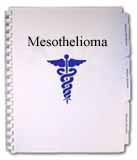|
Mesothelioma and Lung Cancer News - Return to Menu
Mouse model paves way for lung cancer studies
By Gwen Ericson
Lung tumors from mutant mice show an abundance of abnormal, undifferentiated cells. Often mice are used to investigate cancer, because their accelerated life spans allow discoveries to be made in a few months. But most strains of mice stay relatively free of lung tumors, even when exposed to heavy tobacco smoke, so there has been a shortage of models suitable for studying tobacco smoke-induced lung cancer.
Now, cancer researchers at Washington University School of Medicine in St. Louis have developed a strain of mice that readily develops lung tumors with the same genetic mutations found in human lung tumors. Moreover, the mice are especially sensitive to the carcinogenic effects of tobacco smoke.
Yian Wang, M.D., Ph.D., associate professor of surgery, and her collaborator, Ming You, M.D., Ph.D., professor of surgery, will now use the smoke-sensitive mice they developed to test whether various chemopreventative agents can stop the formation and growth of tobacco smoke-induced lung tumors.
"There has been such a lack of good experimental models for studying tobacco-induced lung cancers," says You, director of the Chemoprevention Program at the Siteman Cancer Center. "These mice are much more applicable than any model available before to study prevention and therapeutic research in tobacco smoke-induced lung carcinogenesis."
Ming You
The research team reported its findings in the April 21 issue of Oncogene. To develop the new mouse model, the researchers tested the effects of three different genetic mutations in mice. One mutation, in an oncogene called K-ras, made this potentially cancer-causing gene more active. In contrast, the other two mutations inactivated genes called p53 and p16, which normally suppress tumor growth.
Mice with any one of the three mutations had an increased incidence of lung tumors even under normal environmental conditions, and mice with mutations in both p53 and p16 had a higher incidence of tumors than mice with single mutations.
Exposure to tobacco smoke further increased the incidence of tumors in all the mice; however, the mice with the double mutation (in p53 and p16) were the most sensitive to smoke. When exposed to tobacco smoke for 6 months and then to fresh air for five months, 15 of 16 double-mutant mice developed tumors.
These mice averaged more than three tumors each. Normal mice developed less than half as many tumors under the same conditions.
"The double-mutant mice can give us much more reliable data in our future lung cancer intervention studies, because agents that are able to reduce tobacco-induced lung tumors will cause a marked, readily observable, drop in the number of tumors per mouse," You says.
The three genetic changes tested in the mice are the most frequent mutations found in human lung cancers. Forty percent of human lung adenocarcinomas contain K-ras mutations, 50 percent of all types of human lung cancers have p53 mutations and 70 percent have p16 mutations, according to You.
The research team examined the genetic makeup of the tumors that developed in the double-mutant mice. They found that in addition to the p53 and p16 mutations that they had engineered into the mice, most of the mice's lung tumors had also acquired an activating mutation in their K-ras genes—at the same DNA location commonly found in human lung tumors.
So, the lung tumor cells in the double-mutant mice ended up with all three common mutations associated with human lung cancer. This triple combination of mutations led to larger and more malignant growths and therefore offers a good model to test the effectiveness of therapeutic and preventative agents on aggressive forms of lung cancer.
The research team plans to test the preventative capacity of three putative cancer-preventing agents: green tea; Antitumor B, a Chinese medicinal herb mixture; and budesonide, a steroid used to treat asthma. They also will test the therapeutic benefits of two compounds currently used to treat cancer: etoposide and cisplatin.
"If we see benefits in the double-mutant mice that are treated with preventative or therapeutic agents, we will be pretty confident that we have a model that may lead us to agents that can benefit people as well," You says.
-------------------------------------------------
Wang Y, Zhang Z, Lubet R, You M. Tobacco smoke-induced lung tumorigenesis in mutant A/J mice with alterations in K-ras, p53, or Ink4a/Arf. Oncogene. 2005 Apr 21;24(18):3042-9.
Funding from the National Institutes of Health supported this research.
Washington University School of Medicines full-time and volunteer faculty physicians also are the medical staff of Barnes-Jewish and St. Louis Children's hospitals. The School of Medicine is one of the leading medical research, teaching and patient care institutions in the nation, currently ranked third in the nation by U.S. News & World Report. Through its affiliations with Barnes-Jewish and St. Louis Children's hospitals, the School of Medicine is linked to BJC HealthCare.
Turkish fisheries to fight asbestos ship
03/08/2006 - Turkey's fishing industry will appeal to the nation's highest court in Ankara to reverse a decision letting an asbestos-covered ship into Turkish waters.
The Marmara Union of Fisheries Cooperatives and Nature Warriors environmentalist group say the asbestos-covered Mexican ship Otopan -- due to be towed into the port of Izmir on the Aegean Sea from the Netherlands -- will harm Turkey's fishing industry, Turkey's Zaman newspaper reports.
The ship, which was declared not seaworthy, was docked in Amsterdam for seven years.
Turkey's Environment and Forestry Ministry gave it permission to be dismantled at a private shipyard in the refining town of Aliaga, 40 miles north of Izmir.
Dismantling asbestos-covered ships is forbidden worldwide, said Ali Guney, chairman of the Istanbul Union of Fisheries Cooperatives.
Turkey is not "a dumping ground," he said.
"The Mediterranean was polluted by the waste of chrome factories. Will the Aegean and Marmara seas face the same fate?"
|

































